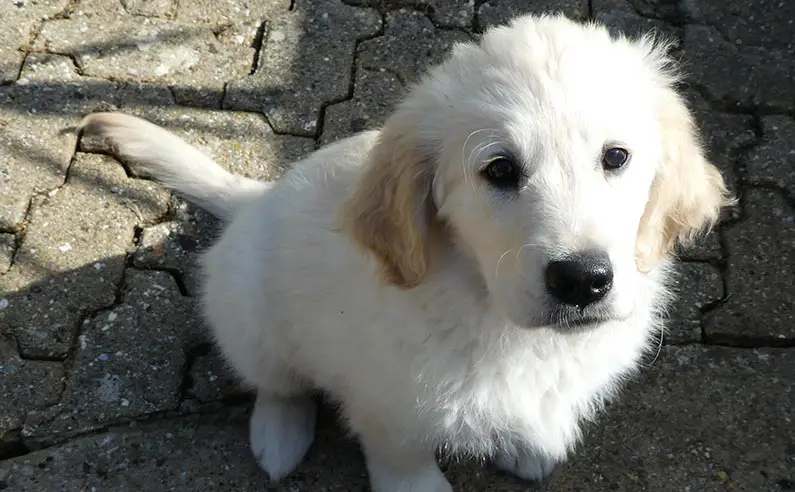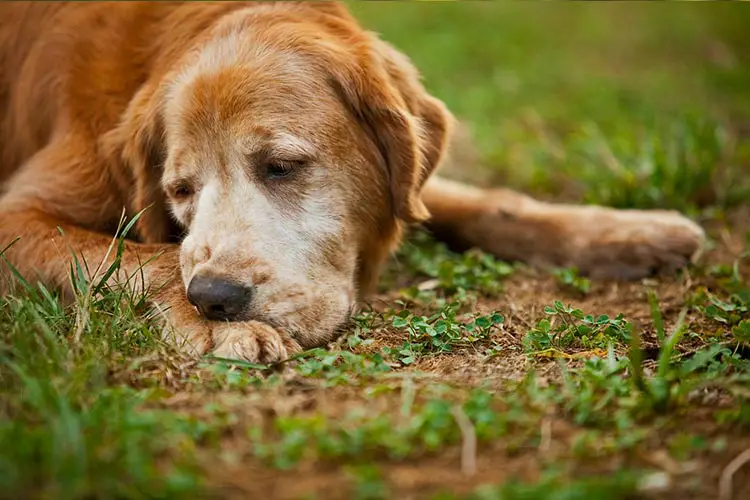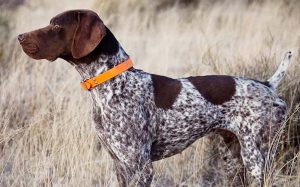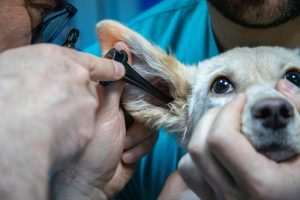
Known to be sociable and loving towards kids and other members of the family, the French bulldog is a small to medium breed that can be tricky to feed due to its sensitivity towards low-quality dog food. So, you might wonder: how much should I feed a French bulldog puppy?
You might also ask: how often should I feed my puppy and what should I feed them? We know how frustrating it is to keep your puppy healthy throughout their entire lives, especially during the earlier weeks when they start transitioning from being nursed to solid food.
Puppies need a lot of nutrition and they should stay away from unhealthy food with unnecessary fillers to avoid getting sick. These fillers could even cause them to get skin allergies, and that’s why we wrote you this article because we want to help you feed your French bulldog puppy properly!
See also:
Whether you will be the breeder of a French bulldog litter or willing to adopt one when the time comes, you’ll need to know just how much and how often to feed them. This will help you to avoid weight issues and health problems for your puppy later on.
In this guide, we will cover the basics of feeding a French bulldog puppy when it comes to feeding schedules, the quantity of food, the type of food you should give, the nutrients to keep in mind, and others. We hope that your French bulldog pup stays healthy and lively with these tips!
Page Contents
How much to feed a French Bulldog puppy?
A French bulldog should be getting at least 1 to 1/2 cups of food a day, which is divided into 3 meals. You can set the first meal in the morning, at noon or afternoon, and near nighttime. Feel free to tweak the schedule depending on your availability but make sure it will be 3 times a day.
With that said the amount of food that your French bulldog should get loosely depends on certain factors. How actively does your puppy get throughout the day? Do they have a genetic history of obesity? Are health problems present in your puppy and do they need special supplements as advised by the vet?
Moreover, your French bulldog will grow differently from the rest so it also depends on their weight at birth. Their age in weeks will also be a factor – some growth spurt weeks might cause them to consume more than they should.
Feeding Chart
Are you looking for a guide on feeding your French bulldog puppy properly? Use this handy chart to find out just how much you need to give them based on their weight and their activity levels:
| Weight | 17 pounds | 19 pounds | 22 pounds | 24 pounds | 26 pounds | 30 pounds |
|---|---|---|---|---|---|---|
| Normal activity | 1.3 cups | 1.5 cups | 1.6 cups | 1.6 cups | 1.7 cups | 2 cups |
| High activity | 1.5 cups | 1.6 cups | 1.7 cups | 2 cups | 2.1 cups | 2.3 cups |
As you can see above, you should feed your French bulldog puppy depending on their weight and physical activity because too much food without exerting effort will make them overweight eventually. However, these are just estimates depending on the puppy’s weight.
Remember to always feed them at least 3 times a day when they are still puppies. The above-mentioned quantity should be divided as equally as possible to avoid getting hungrier at certain times of the day. If you don’t have time to portion properly, you can get an automatic feeder to do the job.
Growth Chart
French bulldogs belong to the small breed group, which puts them in the same place as the Yorkshire Terrier, Chihuahua, and Pomeranian. With that said, here’s a rough estimate of how big your French bulldog will become depending on their age in weeks:
| Age in Month | Weight in Kilograms | Weight in Pounds |
|---|---|---|
| 1 month | 1.3-1.5 kg | 2.8-3.2 lbs |
| 2 months | 2.7-3.5 kg | 6-7.7 lbs |
| 3 months | 4.3-5.4 kg | 9.5-12 lbs |
| 4 months | 5.9-77 kg | 13-17 lbs |
| 6 months | 7.7-10 kg | 17-23 lbs |
| 8 months | 8-11.8 kg | 18-26 lbs |
| 10 months | 9-12.2 kg | 20-27 lbs |
| 12 months | 9-12.7 kg | 20-28 lbs |
| 24 months | 9-12.7 kg | 20-28 lbs |
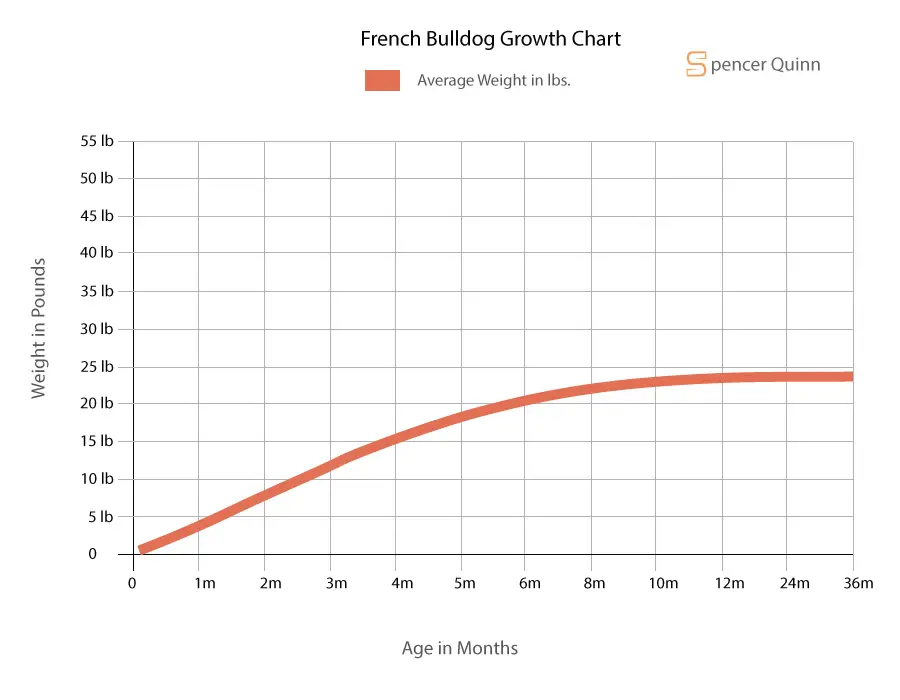
However, that is just an estimate and your French bulldog could still be differently growing from the others in the litter. We recommend talking to your vet for more information on puppy weight so that they can advise on food and nutrition.
Additionally, below are some milestones you need to expect when it comes to your French bulldog puppy’s growth, development, and food intake:
2 to 4 weeks old
A French bulldog puppy during its nursing stage will need to stick with its mother and the rest of the litter. They should be in a safe place with little to no disturbance, especially during nursing time, to help keep them calm while getting their nourishment.
Scared puppies and overwhelmed mothers might not work well if they have external noise and foot traffic, so we recommend placing the mother and the puppies somewhere that’s not so much disturbed. Nursing should be done every 4 hours or so, depending on how much your puppy weighs initially and the mother’s capability to nurse.
By 3 weeks of age, your puppy should have at least twice the weight they had at birth. Keep in mind that during this stage of their life, a French bulldog puppy doesn’t need to be weaned yet and they will only get nourishment from their mother.
Also, during their third week, if your vet recommends it already, have your puppy dewormed to avoid onsets of digestive problems, sickness, and the like. One common mistake of most beginner breeders and pet owners is forgetting to deworm their little ones, but this is crucial since puppies can be prone to sickness.
A French bulldog puppy that is 4 weeks of age can begin the solid food introduction. This makes them far earlier in terms of weaning as compared to other breeds. However, this doesn’t mean that they will completely abandon their mother’s milk!
Try offering your puppy kibble portioned with water to make it easier to digest for them. You can also feed them with bits of raw food, as long as your vet agrees to it and if you prepared the raw food properly. Try beef or chicken depending on your vet’s recommendation.
However, kibble is the most standard way of feeding your French bulldog puppy, especially if you are on a limited budget and if you have a plethora of puppies to take care of. Just make sure to take your time into offering them, as weaning is not an instant process that happens overnight.
6 weeks old
Remember to keep the feeding times slow yet sure. Don’t worry if your French bulldog puppy refuses at first or doesn’t finish the entire meal – there’s always next time. Remove any uneaten food immediately after 20 minutes of not being touched to avoid spoilage (or give to the other puppies).
During the sixth week of your French bulldog puppy, they should somehow already eat solid food, even in little amounts, because it will help with their overall physical development. Consider serving high-quality food that is not made with too many filler ingredients.
Look for French bulldog puppy food that is filled with a lot of protein to help them gain muscle mass and energy throughout the day. This is especially the case for puppies that are often active. Likewise, the 6th week is also the time when your puppy has their first milk teeth so they need comfort food.
Ask your vet about whether your French bulldog puppy is ready to get vaccinations and other supplements by this time. You should always follow up on your puppy’s needs when it comes to their health, especially if your breeder says (or from experience) that your puppy has a history of health issues from their parents.
8 weeks old
Offer your French bulldog puppy 3 meals per day that totals 1 1/2 cups of food, divided equally. You can choose the time of day that you want to feed them, but keep them spaced just fine to avoid bouts of hunger and overeating.
Full raw feeding is also okay by this stage if your French bulldog puppy is fully weaned. Make sure that you calculate your raw food nutrients and calories carefully to avoid a lack of nutrition, or simply ask your vet or breeder about it.
Puppies that are 8 weeks old will also need to be socialized more often. If your French bulldog puppy hasn’t been outside yet or settled with other pups or dogs in your home, make sure to socialize them as early as possible to avoid behavioral issues.
10 weeks old
Continue to give your French bulldog puppy the same amount of food as before, keeping in mind its strict schedule to avoid hunger mishaps that could lead to digestive and weight issues. By doing this, you are training their body clock to eat at certain times.
Some breeders already slowly transition from puppy to adult food during this time. However, don’t do this yet if your puppy is too small in stature. Get advice from your vet as to when your pup should switch to adult formulas since it might disrupt their tummy and overall health.
12 weeks old
So, what’s next for your French bulldog puppy? At 12 weeks of age, still, feed them a 1-1/2-cup amount daily, portioned into three meals. This makes it 1/2 cup each meal if you will feed them in the morning, afternoon, at night.
Treats are okay in minimum amounts but we don’t generally encourage them because they might form begging habits in your French bulldog pup, which can cause obesity later on. This breed gains weight easily so you have to cut their diet strictly and learn to say “no” at times.
If you must feed them with treats due to training, make sure to include it in their list of calories consumed the entire day, and talk to your vet about it. Your vet could even offer treats that are low in calories but are healthy and tasty for your pup as an alternative.
Recommended Food
French bulldogs are known to be prone to diarrhea, skin problems, cherry eye, and hip dysplasia. Therefore, they will need a good amount of nutrients for their food during puppyhood. Here are some recommended food ideas to put on your French bulldog puppy’s dinner plate:
1. Glucosamine foods
Glucosamine is a type of nutrient found in most chicken, fish, and seafood. It is helpful for a puppy’s development of their joints and bones, which makes it suitable for a French bulldog puppy since it has a likelihood of developing hip dysplasia when they get older.
Whether you feed your French bulldog pup with raw or store-bought food, it’s a good idea to put some glucosamine-rich foods in their bowl. You can also talk to your vet about glucosamine supplements although they might only recommend it when needed, such as due to genetic history of joint problems.
2. Omega fatty acids
Omega fatty acids come from fish oil, which can help improve their coat appearance and resist skin allergies. Generally, French bulldogs are known to be very sensitive when it comes to getting skin diseases so having omega fatty acids in their diet is a must.
Your veterinarian might also recommend supplements to help improve their coat appearance. However, of course, a healthy coat and skin still largely depend on proper grooming habits, such as bathing, brushing, and clipping as needed.
3. Quality meat sources
Typical protein sources, such as fish, chicken, lamb, and beef, are a staple for most puppies – French bulldogs included. The trick is to look for a brand that has a certain animal as their first ingredient and not merely a random mixture of meat that you might find suspicious.
When in doubt, we recommend getting puppy food that’s slightly pricier yet higher in quality and nutrients than the usual supermarket types. In this way, you’ll know that your French bulldog puppy is getting the right kind of protein source.
4. Carrots
Vitamin A is found in carrots, which can help lessen the likelihood of cherry eye and similar eye problems in your French bulldog when they get older. Moreover, carrots (and other permissible vegetables) can be added to your puppy’s diet to help balance out their nutrients.

Foods to Avoid
Since the French bulldog is a sensitive breed when it comes to food, here’s a list of items that shouldn’t go into their dinner plate (or bowl):
Canine-toxic vegetables and fruits
These include avocadoes, onions, grapes, raisins, cherries, lemons, and tomatoes. They mostly contain poisonous ingredients that are not suitable for French bulldogs (and all canines, anyway). Keep in mind to stay away from these veggies and fruits as they are only for human consumption.
Chocolate
Theobromine, which comes from chocolate, is a common toxin for dogs, which is why you shouldn’t give your pet any bit of chocolate. If you do want to give your puppy some ice cream, make sure the flavor doesn’t contain any chocolate at all.
Choking hazards
Foods that are considered choking hazards for a French bulldog puppy include asparagus, avocadoes, and cherries. Asparagus is usually okay for French bulldogs, but if you need to feed it to them, make sure to cut them into very small pieces.
Cooked bones are also quite tricky and usually not recommended for French bulldogs due to their threat of being a choking hazard. When the bones split after being cracked and chewed, they could injure your puppy – even when they turn into adults later on.
Fillers like corn and wheat
We did mention that French bulldog puppies have sensitive tummies, right? That’s why they deserve more than just regular supermarket food – they need quality protein sources and better puppy formulas.
Look for high-quality content in your puppy food, such as little to no corn or wheat, and more of healthier carbohydrate sources, such as sweet potatoes, and meats like chicken, fish, beef, and turkey.
Artificial sweeteners and flavorings
A French bulldog puppy shouldn’t be fed with foods that are too sweet or too flavorful, especially if they are artificial like MSG and sweeteners. Not only are they detrimental to canine health but they also don’t have any nutrition for your puppy.
FAQs on Feeding a French Bulldog Puppy
If you want to know more about how to feed a French bulldog properly, here are some additional information on their feeding habits and other tips:
The average calories for a French bulldog puppy should be around 12 calories per pound and you can increase that up to 30 if they are highly active. However, more factors will come into play, such as the type of food and their genetics.
We recommend waiting for your puppy to grow at least 1 year old for them to switch properly to adult food. A French bulldog should be switched from puppy to adult food gradually.
To do this, mix some of the new food and more of the old food in your puppy’s usual bowl. Next, wait for a couple of meals and transition every few days by giving them more of the new food than the old formula. Eventually, after about a few weeks or so, your puppy should already eat only the new food.
What this slow food adjustment does is eliminate the likelihood of stomach upsets. As we mentioned above, French bulldog puppies are prone to digestive issues, which is why you need to be mindful of what they eat.
A puppy that doesn’t eat for a while can sound alarming, however, we will rule out some possibilities. First, if your French bulldog puppy just moved in from an old breeder, they might feel uneasy and might not eat well. Stress is a common factor that can reduce a puppy’s appetite.
You can also try changing their food depending on your veterinarian’s recommendations. Be sure to make the change slowly to avoid ruining their digestive system. Feeding your puppy is all about trial and error because every pup has a different taste preference, after all, just like humans.
However, if your puppy hasn’t eaten for 2 days straight, that’s when you need to take them to the vet right away. It could be an underlying health problem that needs to be addressed.
Raw feeding a French Bulldog puppy
Raw feeding a French bulldog puppy is possible, as long as you get proper advice from your vet. It is quite a complicated process since it involves calculating the amount of protein and nutrients from organ meat, vegetables, fruits, supplements, and others.
There are many benefits to feeding raw – one of which is not having MSG or other artificial additives in your puppy’s food. On the flip side, it is quite a daunting task to prepare raw food for them to ensure that everything is balanced in terms of nutrients.
Another possible problem to keep in mind is the threat of bacteria that comes from raw food that isn’t handled well. If food sanitation is a problem in your area and you live in highly-humid coastal areas, it will be more difficult for you to handle raw meat.
Conclusion
As a whole, French bulldogs are sensitive as puppies and adults. This is why feeding them properly is a must. Always consider what goes into their food and if possible, consult your vet more often so they don’t end up with food allergies and skin problems later on.
French bulldogs, like other breeds, need specific nutrients and also a strict schedule to maintain their weight properly. We hope that this guide on feeding a French bulldog puppy helped you out in raising your companion to be a healthy and happy dog!

